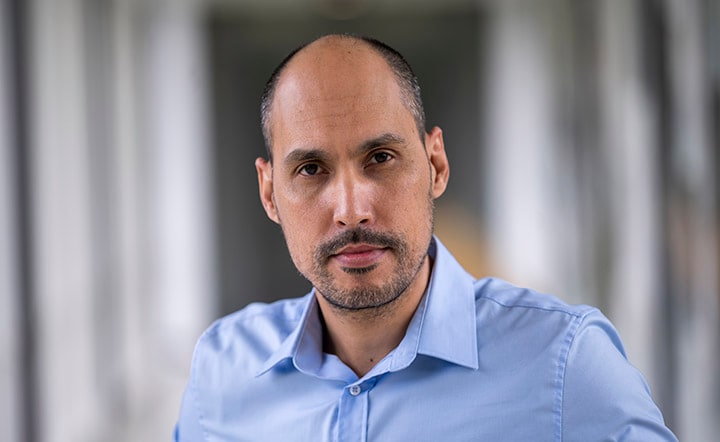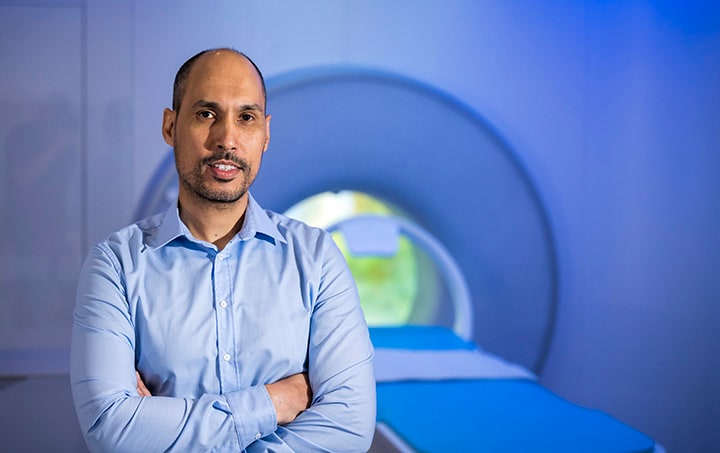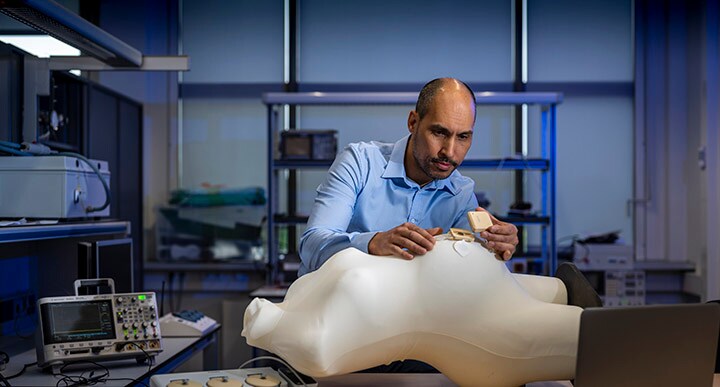Interview
Share on social media
"Inventing is looking for relevant problems and finding new solutions to them that are not obvious"
Signals and systems have always been central to Mohammed Meftah's career. He learned the ropes at the research department that worked on the successor to DVD. Now he works hard on improving the lives of unborn and prematurely born babies with pioneering research.
How did your career begin at Philips?
"I started in 2001 on a team working on Blu-ray, the intended successor to the DVD. After that, one of the things we started doing was researching data storage via holograms. This technology offered the possibility of storing much more data at high speed in comparison to flat optical disks. In 2005, I made the move to medical technology."
Was that a big difference?
"There is more similarity between reading data from discs and from the human body than you might think. The main difference is that the human body is much more complex than an optical disc that we can design ourselves to read data optimally. That makes the medical research field challenging and fascinating, because of its greater social impact."

What kinds of technologies are you working on?
"My expertise lies in the field of contactless monitoring of patients. Think of smart sensors that allow you to measure electrocardiograms and camera technology for monitoring vital signs such as breathing, heart rate and oxygen saturation. With these innovations, we can monitor patients in a comfortable and reliable way, without having to stick anything on the skin."
What can you do with that?
"In premature babies, sensors are currently attached to the skin to monitor them. The skin is an important organ, and sticking sensors on the skin can cause stress and pain in babies. It would of course be great if we could develop a better alternative for this, for example special sensors in the incubator mattress and cameras on the incubator for contactless monitoring.
The biggest challenge in acquiring reliable signals is that they are affected by movements that a baby makes, and also disruptions to the signals arising from care-related handling by parents and nurses. The challenge is to be able to accurately record and process vital signs despite these disruptions so that the nurse or neonatologist can make the correct clinical decision."

In which Philips solutions can we find your inventions?
"Our inventions and insights in the field of non-contact monitoring are used in a range of applications, such as in MRI scanners; with VitalEye, distortions caused by breathing can be corrected automatically. Thanks to VitalEye, we can make better MRI images, with the patient having to spend less time in the scanner. This is more pleasant for the patient and saves costs for the hospital."
"That's the beauty of working at Philips. While working on your main research project you discover new applications for your technology. A kind of platform emerges, as it were, that, with some minor adjustments, can be used for different purposes."
"We were the first in the world to demonstrate that measuring oxygen saturation with a camera, under different practical conditions, is possible. In addition to great publications, this has also resulted in a number of important patents."
“We were the first in the world to demonstrate that measuring oxygen saturation with a camera, under different practical conditions, is possible. In addition to great publications, this has also resulted in a number of important patents.”
Mohammed Meftah
Senior Scientist
What are you currently working on?
"We are now looking at the possibilities of fetal monitoring, or monitoring the unborn child but from home. Women with complicated pregnancies, such as gestational diabetes or hypertension, often have to visit the hospital for routine checkups because of increased risk in their pregnancy. Of course, it is not pleasant to visit the hospital several times a week for a half-hour measurement, it can even cause a lot of stress.
Wouldn't it be nice if pregnant women could take measurements themselves in their familiar home environment, in a user-friendly yet reliable manner?” The OBGYN physician can then assess the data remotely from the hospital, make diagnoses and possibly initiate interventions.

For your work, you recently received an Invention Award; a recognition for reaching the milestone of ten patents. What did that mean to you?
"That is of course an honor, because patenting new technology is very important for Philips. But perhaps I get the most satisfaction from going through the entire innovation process. It starts by clarifying the needs of the end user, the patient and health care professional. We talk to them a lot to better understand their practice and come up with solutions for their challenges, in a co-creation framework.
“Perhaps I get the most satisfaction from going through the entire innovation process. It starts by clarifying the needs of the end user, the patient and health care professional. We talk to them a lot to better understand their needs and come up with solutions for their challenges, in a co-creation framework.”
Mohammed Meftah
Senior Scientist
We're looking for the most relevant problems, and then coming up with a solution for them. And if that solution is new and not obvious, you basically have an invention. That whole process is what makes my job great; that you see something that we came up with can actually make a difference in the life of a doctor or a patient."
Within Philips, thousands of inventors work every day on the technologies of tomorrow. What drives them? How do they come up with their ideas and how do they successfully bring them to market? In the series Impactful Inventors, we answer these questions.
Also read:
Henk van Houten, Chief Technology Officer: "Invention Awards winners are the heroes of Philips Research"
Mark Johnson, the man of hundreds of patents: "There is no training to become an inventor"
“We were the only European team invited to present at an AI event in the US White House”; Anca Bucur is on a mission to turn data and artificial intelligence from a promise to an actual, tangible clinical benefit.
